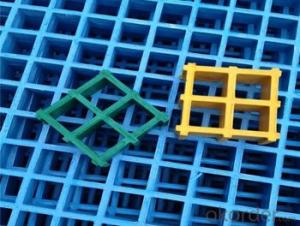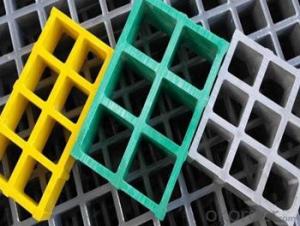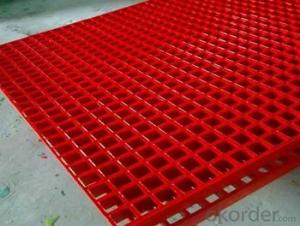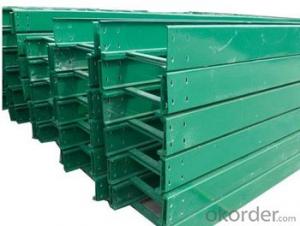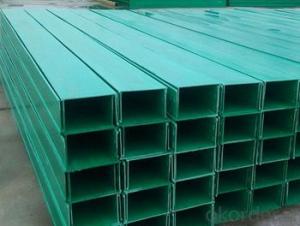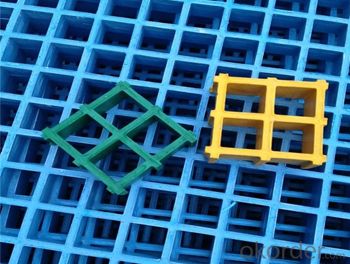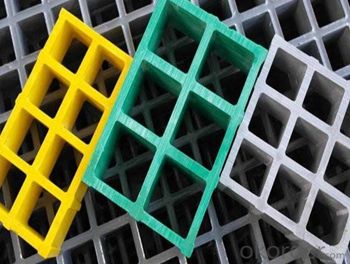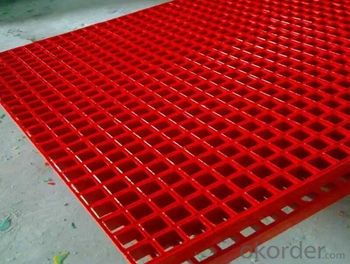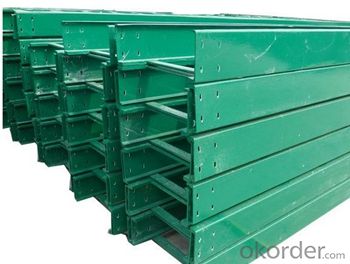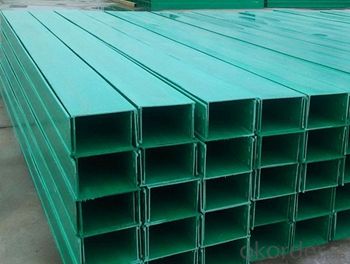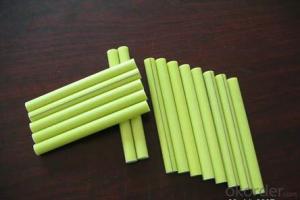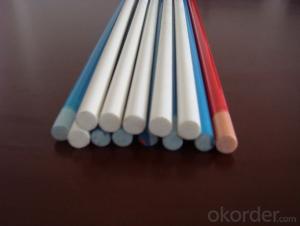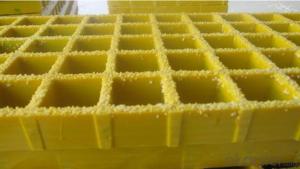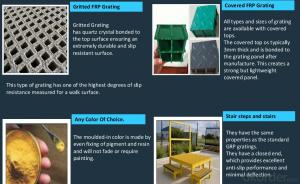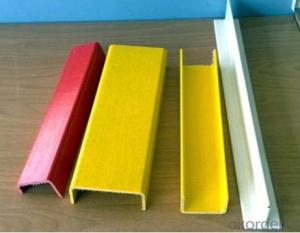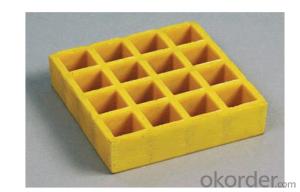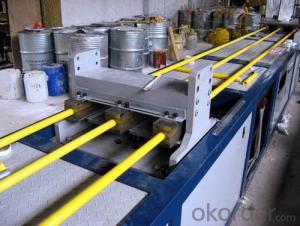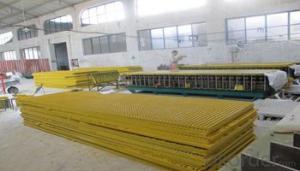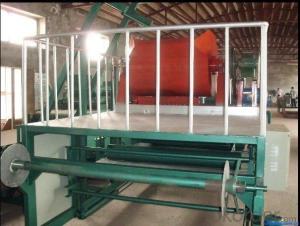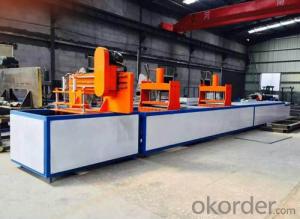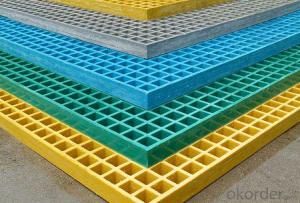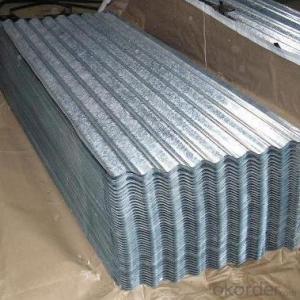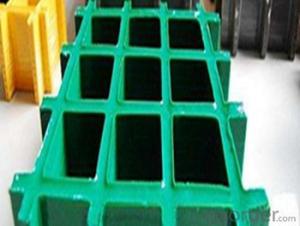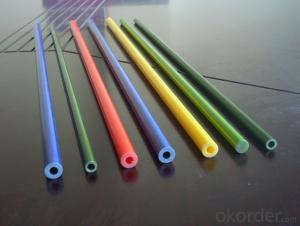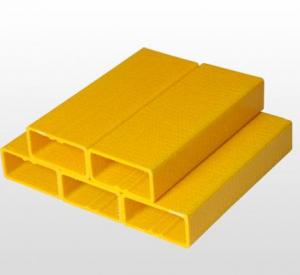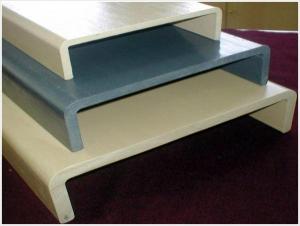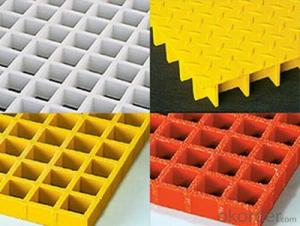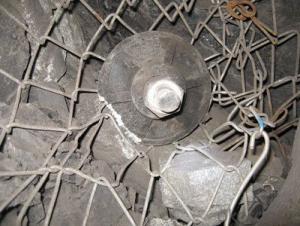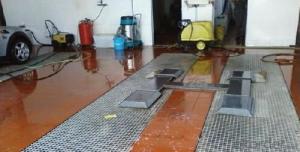FRP Pultrusion Profiles - Pultruded Grating Anti-Slip Safety Made in China, Various Styles
- Loading Port:
- Tianjin
- Payment Terms:
- TT OR LC
- Min Order Qty:
- 80 watt
- Supply Capability:
- 100000 watt/month
OKorder Service Pledge
OKorder Financial Service
You Might Also Like
Specification
PRODUCT DESCRIPTION
Pultruded grating is made by a particular assembly process, which using “I” shape as its main load-bearing and special rod to go through the bearing bar. Pultruded grating include the standard grating and the custom grating, the custom grating can be designed to meet customer’s requirement or special using condition by changing the shape, size and space of the bearing bars, the surface can be covered with lozenge panel, grit panel, or added the anti-slippery sand directly.
FRP pultruded grating has the most characteristics of molded grating, but it has its distinct advantages, it has very high fiberglass content in the loading direction, so it has very high load capability, it has more superiority when used at wide span, so that the basic support will be decreased and the project cost will be reduced accordingly.
SPECIFICATION
The standard space between two crossbars is 6 inch or 12 inch.
Thickness (mm) | Bar width (mm) | Open space (mm) | Open rate (%) | Approx weight (kg/m |
25.4 | 15.2 | 22.8 | 60 | 13.2 |
25.4 | 15.2 | 15.2 | 50 | 15.9 |
25.4 | 15.2 | 10.1 | 40 | 18.5 |
25.4 | 40 | 10.8 | 21 | 14.5 |
38.1 | 15.2 | 22.8 | 60 | 15.8 |
38.1 | 15.2 | 15.2 | 50 | 19.1 |
38.1 | 15.2 | 10.1 | 40 | 22.4 |
50.8 | 25.4 | 25.4 | 50 | 16.6 |
50.8 | 25.4 | 12.7 | 33 | 21.1 |
CHOICE FOR PULTRUDED GRATING
Resin: GP resin, ISO resin, VE resin, Phenol resin
Color choice: Yellow, gray, green, custom color
Surface choice: Groove surface, grit surface, lozenge cover surface
FIELDS SERVED
Sewage treatment,
water supply and drainage,
chemical industry,
oil industry,
power engineering,
pulp and paper,
construction engineering,
spinning, marine engineering.
APPLICATION
Operation terrace,
stair walkway,
ground floor,
trench cover,
sidewalk,
foot bridge,
equipment safety fence,
scaffold.
COMPANT DESCRIPTION
CNBM,China National Building Materials Group is a state-owned enterprise in charge of administrative affairs in china building materials industry. Established in 1984, CNBM is a large group corporation of building materials with total assets of 25 billion RMB and a total staff of 30,000.CNBM now owns 200 subordinating firms of solely owned and joint-venture companies.
CNBM International Corporation is one subsidiary of CNBM, we focus on offering good-quality products,professional service and complete solution to our customers. Strong delivery capacity, advanced technology& management, strong financing capability and excellent after-sale service are our advantages in sharing international market.
FAQ
1.Q:Are you factory or trading company ?
A:We are Factory produce FRP machines and FRP products.
2.Q:If can customized by customers requirements?
A:yes,we can produce the machine with customized size.
3.Q:How about the payment?
A:We accept any kind of payment.
4.Q:What is the guarantee?
A:Gurantee is one year.
5.Q:If you can training?
A:yes ,we can training in our factory also can send engineers to your factory training.
PICTURES
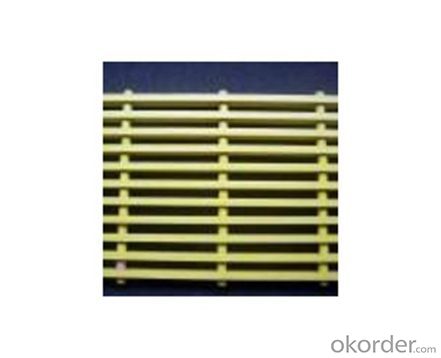
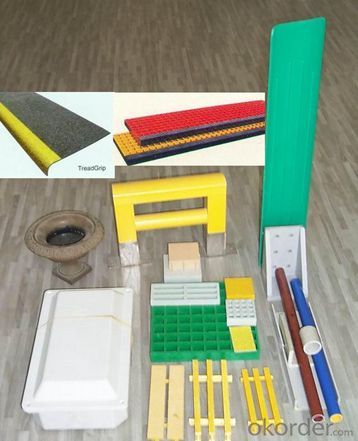
- Q: Can FRP pultrusion profiles be used in renewable energy projects?
- Yes, FRP pultrusion profiles can be used in renewable energy projects. FRP (Fiber Reinforced Polymer) pultrusion profiles offer high strength, durability, and corrosion resistance, making them suitable for various applications in renewable energy projects. They can be used in the construction of wind turbine blades, solar panel frames, and structural supports for renewable energy infrastructure. Additionally, FRP pultrusion profiles can provide cost-effective solutions by reducing maintenance requirements and improving the overall performance of renewable energy systems.
- Q: Can FRP pultrusion profiles be used in architectural or decorative applications?
- Yes, FRP pultrusion profiles can definitely be used in architectural or decorative applications. FRP, which stands for Fiber Reinforced Polymer, is a composite material that combines strong fibers, such as glass or carbon, with a polymer resin matrix. This combination creates a lightweight, durable, and corrosion-resistant material that is ideal for various applications, including architecture and decoration. FRP pultrusion profiles can be manufactured in a wide range of shapes and sizes, making them highly versatile for architectural and decorative purposes. These profiles can be used to create aesthetically pleasing structures, such as columns, beams, and facades, that enhance the visual appeal of buildings. Additionally, FRP pultrusion profiles can be fabricated to mimic the appearance of other materials, such as wood or metal, allowing for the creation of decorative elements that blend seamlessly with the overall design. Furthermore, FRP pultrusion profiles offer several advantages over traditional materials commonly used in architecture and decoration. They are lightweight, which makes them easier to handle and install, reducing labor costs. They are also highly resistant to corrosion, weathering, and UV radiation, ensuring long-lasting performance in outdoor applications. Additionally, FRP profiles can be customized to meet specific design requirements, including color, texture, and surface finish, providing endless possibilities for creative expression. In summary, FRP pultrusion profiles are a viable option for architectural and decorative applications. Their lightweight, durable, and customizable nature makes them suitable for a wide range of design needs, while their corrosion resistance ensures longevity and low maintenance. Whether it's for structural support or decorative embellishments, FRP pultrusion profiles offer an excellent choice for enhancing the aesthetics and functionality of architectural and decorative projects.
- Q: What is the shear strength of FRP pultrusion profiles?
- The shear strength of FRP pultrusion profiles can vary depending on various factors such as the specific type of resin used, the reinforcement material, and the design of the profile. However, in general, FRP pultrusion profiles have high shear strength compared to traditional materials like steel or aluminum. The shear strength typically ranges from 50 to 150 MPa, making them suitable for various structural applications.
- Q: Can FRP pultrusion profiles be used in the construction of train or subway platforms?
- Yes, FRP (Fiber Reinforced Polymer) pultrusion profiles can be used in the construction of train or subway platforms. FRP pultrusion profiles are made of a combination of reinforced fibers and a polymer resin matrix, which gives them high strength and durability. These profiles are lightweight, corrosion-resistant, and have excellent mechanical properties, making them suitable for various applications in the construction industry. When it comes to train or subway platforms, FRP pultrusion profiles can be used for various structural components such as handrails, guardrails, gratings, and decking systems. These profiles provide a non-conductive and non-magnetic solution, which is essential in railway environments to prevent interference with electrical and signaling systems. Furthermore, FRP pultrusion profiles offer a high level of customization, allowing them to be tailored to specific project requirements. They can be manufactured in various shapes, sizes, and colors to meet the aesthetic and functional needs of train or subway platforms. Moreover, FRP pultrusion profiles have excellent resistance to environmental factors such as moisture, chemicals, and UV radiation. This resistance ensures that the profiles remain durable and maintain their structural integrity over time, even in harsh and corrosive conditions commonly found in railway environments. Overall, FRP pultrusion profiles are a reliable and cost-effective choice for the construction of train or subway platforms. They provide numerous advantages including strength, durability, customization options, and resistance to environmental factors, making them a suitable alternative to traditional materials in these applications.
- Q: Can FRP pultrusion profiles be used in high-voltage applications?
- Yes, FRP pultrusion profiles can be used in high-voltage applications. FRP (Fiber Reinforced Polymer) materials are known for their excellent electrical insulation properties, making them suitable for high-voltage environments. Additionally, FRP pultrusion profiles offer advantages such as high strength, corrosion resistance, and lightweight, making them a viable option for high-voltage applications.
- Q: Are FRP pultrusion profiles resistant to alkalis?
- Yes, FRP (Fiber Reinforced Polymer) pultrusion profiles are generally resistant to alkalis. This is due to the fact that FRP composites are non-metallic materials that are composed of a polymer matrix reinforced with fibers, such as glass or carbon. The polymer matrix in FRP pultrusion profiles provides excellent resistance to alkalis, making them suitable for applications in environments where alkalis are present, such as chemical processing plants, wastewater treatment facilities, or marine structures. However, the specific resistance of FRP pultrusion profiles to alkalis may vary depending on the type of polymer resin used and the concentration and temperature of the alkali solution. Therefore, it is important to consult the manufacturer's specifications or conduct specific tests to ensure the compatibility of FRP pultrusion profiles with the intended alkali environment.
- Q: Are FRP pultrusion profiles resistant to caustic soda?
- FRP pultrusion profiles are generally immune to caustic soda, which is a potent alkaline substance capable of corroding certain materials. However, FRP pultrusion profiles consist of robust fibers (like fiberglass) combined with a resin matrix (such as polyester or epoxy). This composite construction renders them highly resistant to chemicals, including caustic soda. Consequently, FRP pultrusion profiles find extensive application in industries prone to exposure to corrosive substances, such as chemical processing, wastewater treatment, and mining. It is worth noting that the choice of resin in the FRP profiles, along with the concentration and temperature of the caustic soda, can impact the overall level of resistance.
- Q: Are FRP pultrusion profiles resistant to vibration or shock?
- FRP pultrusion profiles exhibit high resistance to both vibration and shock. Their exceptional properties, inherent in FRP materials, make them an ideal choice for applications that demand durability and strength in the face of dynamic loading conditions. The composition of FRP profiles typically entails a combination of reinforcing fibers and a resin matrix, resulting in superb stiffness and damping characteristics. As a result, FRP pultrusion profiles effectively absorb and dissipate vibrations and shock forces, effectively preventing damage or degradation. Moreover, the design flexibility of FRP enables tailored reinforcement and optimization, further bolstering their ability to withstand vibration and shock. Consequently, FRP pultrusion profiles prove to be a dependable option for industries such as aerospace, automotive, marine, and structural engineering, where these properties are of utmost importance.
- Q: Are FRP pultrusion profiles impact resistant?
- Yes, FRP (Fiber Reinforced Polymer) pultrusion profiles are known for their high impact resistance. The combination of strong reinforcing fibers and a polymer matrix makes them highly durable and able to withstand significant impact forces without breaking or deforming.
- Q: Are FRP pultrusion profiles resistant to chemical spills or leaks?
- Yes, FRP (Fiber Reinforced Polymer) pultrusion profiles are highly resistant to chemical spills or leaks. The combination of the fiberglass reinforcement and the polymer matrix used in FRP pultrusion provides excellent resistance to a wide range of chemicals, acids, and corrosive substances. This makes FRP pultrusion profiles a suitable choice for applications where chemical resistance is crucial, such as in chemical processing plants, wastewater treatment facilities, and storage tanks.
Send your message to us
FRP Pultrusion Profiles - Pultruded Grating Anti-Slip Safety Made in China, Various Styles
- Loading Port:
- Tianjin
- Payment Terms:
- TT OR LC
- Min Order Qty:
- 80 watt
- Supply Capability:
- 100000 watt/month
OKorder Service Pledge
OKorder Financial Service
Similar products
Hot products
Hot Searches
Related keywords
